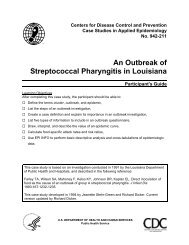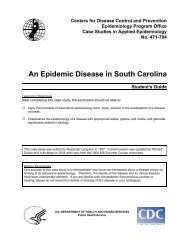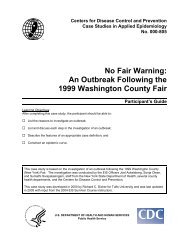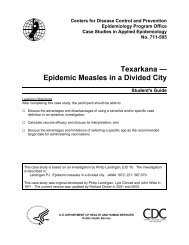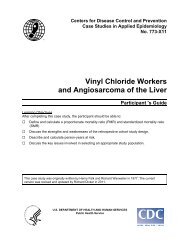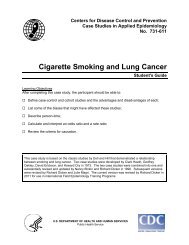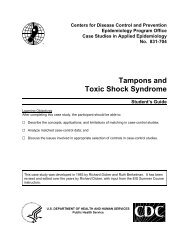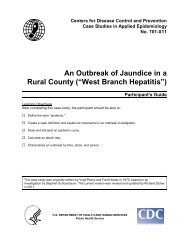Oral Contraceptive Use and Ovarian Cancer - Library
Oral Contraceptive Use and Ovarian Cancer - Library
Oral Contraceptive Use and Ovarian Cancer - Library
- No tags were found...
You also want an ePaper? Increase the reach of your titles
YUMPU automatically turns print PDFs into web optimized ePapers that Google loves.
CDC-EIS: OCs <strong>and</strong> <strong>Ovarian</strong> <strong>Cancer</strong> (811-X11) - Participant’s Guide page 2<br />
Part I<br />
In 1980, ovarian cancer ranked as the fourth<br />
leading cause of cancer mortality among women<br />
in the United States. An estimated 18,000 new<br />
cases <strong>and</strong> more than 11,000 attributable deaths<br />
occurred among American women that year.<br />
Several studies had noted an increased risk of<br />
ovarian cancer among women of low parity<br />
(parity = number of liveborn children a woman<br />
has delivered), suggesting that pregnancy exerts<br />
a protective effect. By preventing pregnancy,<br />
oral contraceptives (OCs) might be expected to<br />
increase the risk of ovarian cancer. On the other<br />
h<strong>and</strong>, by simulating pregnancy through<br />
suppression of pituitary gonadotropin release<br />
<strong>and</strong> inhibition of ovulation, OCs might be<br />
expected to protect against the subsequent<br />
development of ovarian cancer. Because by<br />
1980 OCs had been used by more than 40<br />
million women in the United States, the public<br />
health impact of an association in either direction<br />
could be substantial.<br />
To study the relationship between oral<br />
contraceptive use <strong>and</strong> ovarian cancer (as well as<br />
breast <strong>and</strong> endometrial cancer), CDC initiated a<br />
case-control study — the <strong>Cancer</strong> <strong>and</strong> Steroid<br />
Hormone (CASH) Study — in 1980. Casepatients<br />
were enrolled through eight regional<br />
cancer registries participating in the Surveillance,<br />
Epidemiology, <strong>and</strong> End Results (SEER) program<br />
of the National <strong>Cancer</strong> Institute.<br />
Question 1a: Which investigations need to be reviewed by an institutional review board? Does this<br />
investigation need to be reviewed?




